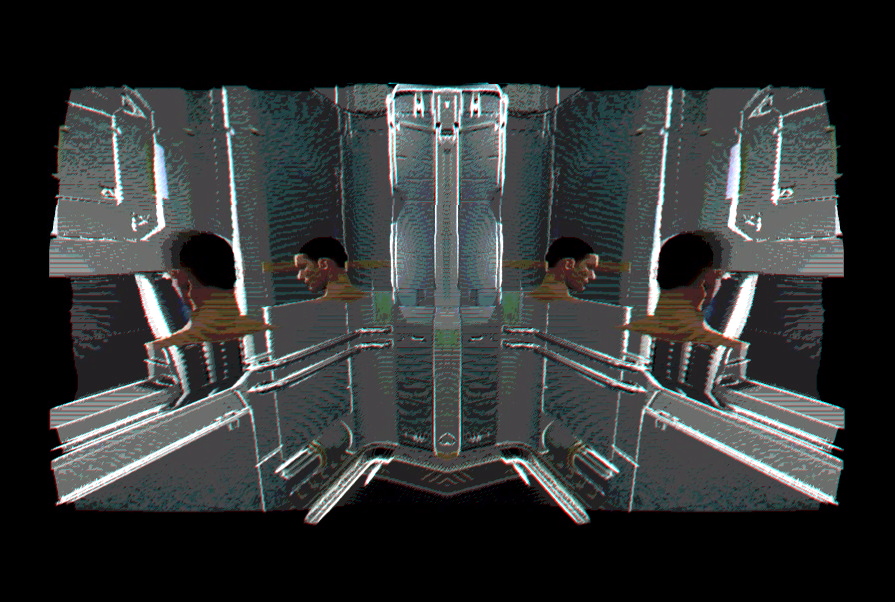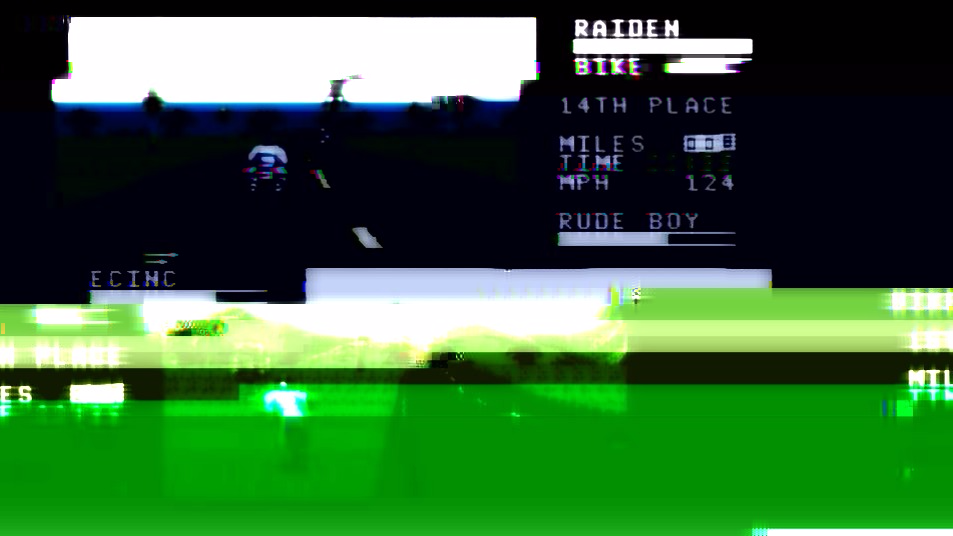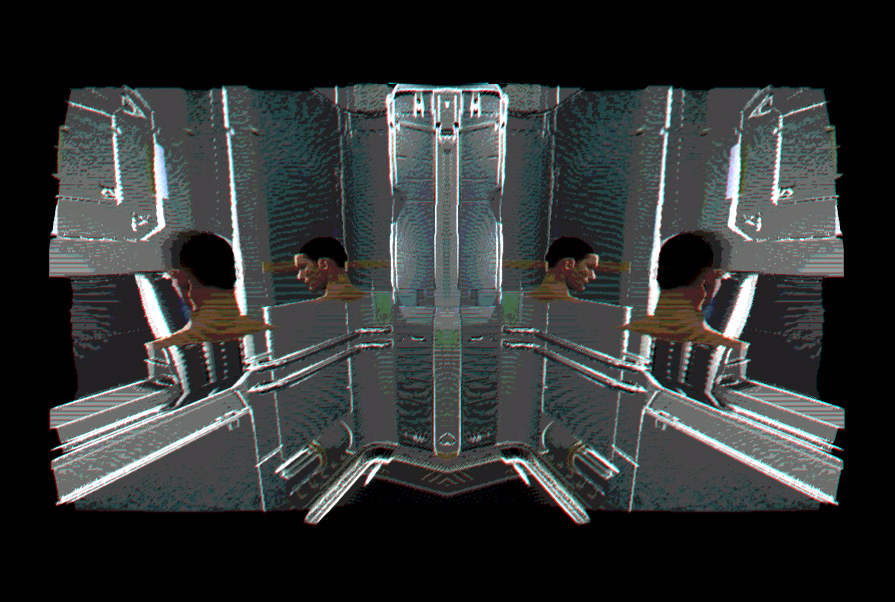- Kurt
Well, my full name's Kurt Kaufman, and I'm old.
- David
[Laughs.]
- Kurt
No I'm not. I'm young.
And I live in Northern California, north of San Francisco. I'm actually up in wine country, up by Lake Sonoma. It's a little town called Geyserville. Actually, one of my hobbies is making wine and it actually became more than a hobby last year. I'm making it legally now. [Laughs.]
- David
[Laughs.] So what did you do in videogames?
- Kurt
So, what happened was my background was industrial design and when I was in school, I kind of -- to make a long story short, decided I wanted to work on movies and I spent about four years trying to get movie work and in the meantime doing a lot of freelance illustration and I finally got my first real movie job at ILM. That was around 1990, I think. And so I worked pretty steady there for about a year and the movie I was on ended and so there was no union at the time for me to be in and so the work was too spotty. I couldn't make a living. I had two little kids. And somebody told me about this start-up company called 3DO.
They were looking at hiring people from the film industry, and at the time -- I don't know if you know, but I'm sure you were aware -- there was a big marketing push to merge film and videogames.
- David
Yeah.
- Kurt
That was kind of exciting, and it was a steady job.
- David
Well, so according to your portfolio site, by that time when you went to go work for 3DO, you had worked on Hook and Jurassic Park. Is that right?
- Kurt
Yeah.
- David
What was that transition like? Going from working on fairly big movies to working at a startup in videogames at 3DO?
- Kurt
It was really different. I wasn't -- again, my background was industrial design, so when I went to ILM, I was relatively new at film. So it's not like I was a seasoned film designer. While I was there, it was just sort of nose to the grindstone and cranking out artwork, and at a fairly high level, pretty demanding level of quality.
So, when 3DO told me they were trying to merge film and videogames, I just assumed they were looking for that kind of quality.
- David
Were they? Or how was what what they were looking for different, quality-wise?
- Kurt
Well, they were looking for quality but there was definitely a disconnect between what that meant and what the system was capable of, and I didn't know much about the technology at the time. It was a big learning curve to me: the 3DO, what was expected, what I could expect of the system, and what we could actually produce. So, it was a lot of money on the job. A lot of hit the ground running.
- David
As art director at 3DO, what is that job actually?
- Kurt
Well, it probably depends on the game, but I did do a lot of art. I did do a lot of drawing and art directing other artists. So I did a lot of sketches and handed those off to other artists, and I also completely learned how to use not just 3D but the computer. I didn't do anything on the computer up until that point. So, it was crazy times really.
- David
What games did you work on at 3DO?
- Kurt
I worked on a game called Zhadnost. [Laughs.] It was called Zhadnost: The People's Party. It was sort of a spoof, a Russian game-show spoof. It was a lot of 3D environments, but with little small low-res animations on top of it, animated set pieces, and then 2D video composited into that. So, it was kinda fun.
- David
You mentioned you've been talking to people recently about stuff in the game industry, possibly doing some work. Has the extent of your experience, though, been with 3DO?
- Kurt
Well, I didn't do much up until the last couple years. But recently I've done some freelance design work on a couple games. Not a lot. For the past two years it's been -- up until then I was pretty much a full-time employee. So I'm back doing freelance which is really crazy. It's been really hard and a challenge to get work and keep up to the new scene.
- David
You're talking about right now?
- Kurt
Yeah.
- David
I'm freelance also. I know exactly the obstacles you're talking about.
- Kurt
Yeah, being self-employed is really different. I was pretty fortunate most of my career to have good work and work at relatively big feature films. Being out on my own, freelance is a big adjustment.
- David
Why did you leave 3DO?
- Kurt
3DO? They fired me.
- David
Oh, I'm so sorry.
- Kurt
[Laughs.]
- David
Maybe those wounds have healed, but I had no way of knowing.
- Kurt
Well, it's been long enough. [Laughs.]
- David
I'm sorry.
- Kurt
[Laughs.]
- David
Well, so you don't have to tell the story about that. But something that I've found on my research with this is it doesn't really seem like project management is too perfected in this industry. I appreciate it's a difficult thing to shepherd and handle, and so I'm not trying to get you to talk bad about a former employer, but did you feel like there were things at that time you noticed that they could have done a better job of?
- Kurt
Of course.
- David
[Laughs.]
- Kurt
But it's such a difficult process, as you know. As far as my personal experience, I don't think that has much to do with the industry really in general. It was a sort of a fast-moving process with new technology. I personally didn't really realize what I was getting myself into.
I could say I was definitely a little cheated. I thought I did a really good job. They really wanted to get rid of me. I think that didn't make a lot of sense. I guess some people didn't like me. And, you know, it wasn't me because they were at it for four years and -- you might know this better than I do? But I think Zhadnost and maybe one other title were the only -- well, at that point, when I was let go. I mean, I don't know how long they published after that. They didn't publish very much.
- David
I mean, so, 3DO only really lasted until 1996. It didn't last very long. I guess they officially went defunct in 2003, but I'm trying to remember how many games they ended up releasing. I don't think it was many.
- Kurt
Yeah. I don't think so, either.
- David
Why do you think that was?
- Kurt
Well, I don't know if I could explain it. Really, it's probably all the reasons you would expect. With such a challenging task, what can go wrong will go wrong, right? Personality conflicts, lack of experience, new technology. You know, 3DO was doing two things: They were developing new hardware and developing software. I was on the software end of it.
The hardware, actually, was very good. A lot of people don't realize it, and they won't believe me -- it's funny, I was just talking to some friends about this -- but the 3DO machine was much better than the first PlayStation, technically. It could produce better images. But Sony just killed them with marketing.
Just before 3DO was ready to launch, Sony just flooded the market and gave away machines to hotel chains and to the journalists and anybody who'd take 'em and play 'em. They had a lot of developers already lined up and a lot of the 3DO developers dropped out.
So, the hardware did not fail because of it wasn't up to the standards. It was everything else. It was just getting it out there and marketing and money.
- David
We've seen the same thing happen over and over again with Beta being superior to VHS.
- Kurt
Exactly, yeah.
- David
Lots of other examples. So, I mean, granted that you didn't have a lengthy career at the time you went to go work for 3DO, but you mentioned PlayStation. Looking back now, what seems different now about the industry than back then? What sticks out as the key, main things that have changed?
- Kurt
Well, obviously the graphics. They can actually do now what they wanted to do back then. Right?
- David
Which was what?
- Kurt
Well, they wanted to do film-quality imagery. It's not quite there but it's pretty damn close with the fourth-gen systems. So, the thing that -- my general comment, and, again you might be able to name some games that will prove me wrong, but my sort of impression and maybe criticism in general, broad-stroke, general criticism, is they're basically doing the same thing but better.
- David
[Laughs.] I would agree. I don't even know if it's better. I think a lot of them are doing the same thing, and it just looks better.
- Kurt
Well, yeah. I come from the visual end of it, so.
- David
Why do you think games are so obsessed with Hollywood and movies? As someone who has actually worked on both, I'm curious to hear your perspective on that fixation.
- Kurt
Can you get more specific? What do you mean?
- David
Sure. Some of it has to do with what you were saying, about how back then they were going for movie-quality cinematics. But the big thing I hear from people in the game industry is they like to say they're bigger than Hollywood, as if it's something they're competing against. That videogames want to be like movies but they're somehow better because you can interact with them.
- Kurt
Yeah.
- David
I don't know. Because I don't feel like movies were all that interested in videogames when all this was going on, during the time you were working in that space. If memory serves, it was much more videogames going after movies. Coming from movies and going into videogames and then back to movies, where do you think that comes from? Why the desire to emulate and overtake?
- Kurt
I don't think that they were looking at overtaking it at the time. I don't think that was their goal. I think there's something about the experience of being able to create that kind of imagery as you can in the film. I think the game industry just wanted to get some of that. They just wanted some of that.
It's sort of a natural progression, looking at the very beginning of games and how it gradually just became better and better quality imagery. Not to say all mediums have to be that. Obviously not, but I think -- and VR's the next step. It's that immersive experience of feeling like you're there. That's just sort of the goal in general. A lot of it is capitalizing on films that were successful and using that IP, right? And vice versa from the games that have been successful to now there's movies being made from successful games.
It doesn't surprise me that videogames -- that there's more money there. If you look at the target audience and the experience kids can have with a videogame. And going to a movie is -- well, you don't have to go to the movies anymore.
- David
[Laughs.] That's true.
- Kurt
It's a short-lived experience. A movie's two hours long and then it's over. You don't want to be watching the same thing over and over again.
Personally, I don't want to spend a long time doing either. I like getting wrapped up in a story, in a good story -- which is not all that common anymore. Especially effects movies.
- David
What about videogames? Do you feel like they tell stories or even good stories?
- Kurt
Not that I've seen. I'm sure there are some good ones.
- David
Did you see a comparable amount of care or attention to stories at 3DO to, like, your time at ILM?
- Kurt
No.
- David
You got the sense that 3DO or game companies don't have an eye for that?
- Kurt
Well, they didn't at 3DO at the time. It's not an easy thing. The movie industry has had a lot of practice. They had a lot of time to figure that out. And really, your storytelling is much easier and nonlinear. They said they wanted to do it but honestly, how seriously can they take that when you're trying to do everything else you have to do with a game?
I would say my biggest surprise over the past -- I remember Myst, of course. Everybody was really blown away by that. We all expected that to just blossom and we expected that to become a genre that would be really fascinating, that you'd just keep going and growing and it'd only better and better. Not just a second Myst, but there'd be more of them. And that didn't really happen.

- David
Do you know what the Game Developers Conference is?
- Kurt
Sure.
- David
I did another interview for this and she talked about the year that Myst came out and it did phenomenally. It sold a ton of copies. But at GDC, even though the public had spoken and loved it, she said developers were sneering that Myst "wasn't a real game" and were dismissing it.
- Kurt
Huh. You mean at the time, when it just came out?
- David
Yeah.
- Kurt
Yeah, that doesn't surprise me. Because it really was more of a -- compared to the interactive games that we were working on, Myst was kind of a page-turner, right? You couldn't fly through and it wasn't any of that virtual --
- David
But it was a page-turner in the sense, too, of what games could be seen as capable of doing. When CD-ROMs were new and people were just trying to explore all the different ways to use that available space.
- Kurt
Yeah. It was just really different. It was a great use of the technology, really. [Laughs.]
The industry not being behind it doesn't surprise me, but usually what I would say surprises me is that they didn't come around because it did sell well. It all comes down to the consumer, usually. I think the biggest -- if you want to fault anything for the game industry, you can fault the consumer. [Laughs.]
I mean, what they're making is what sells.
- David
Why didn't it surprise you the industry wasn't really behind it if the audience was into it?
- Kurt
Well, I mean, at the time when it came out, I could understand the hardcore industry people not really wanting to jump onboard. It was just so different. What I'm sort of reacting to is not a marketing decision but just an opinion from the industry people to not want to really go that route. But I am a little surprised that the marketing people and other entrepreneurs didn't pick up the ball and run with it.

- David
I mean, I remember there was a parody -- this is how successful Myst was, that there was actually a parody of that game. I can't believe I'm about to talk to you about this and dredge it up at all. But not only was there a Myst sequel, but there was also -- do you remember Pyst?
- Kurt
No. [Laughs.]
- David
We're talking about a game so successful that someone else would make another game making fun of it.
- Kurt
Yeah.
- David
Like, if you want to talk about comparing games to movies, the movie industry has the Scary Movie series.
- Kurt
Right.
- David
Naked Gun. Airplane. UHF. A long line of movies mocking other movies. Is it that the movie industry is more willing to make fun of itself than the game industry?
- Kurt
Oh, I don't know. Yeah. I think part of -- well, how did that game do? How did Pyst do?
- David
[Laughs.] The company went out of business before they could finish making its parody of Myst's sequel. But John Goodman was in Pyst.
- Kurt
The only thing I would guess is that the development process is so hard and expensive and laborious, maybe there just aren't a lot of people that want to put that much work and money into criticizing their own industry, basically.
I just think in general, it's hard to get investors to invest in something they don't know is going to make money. With a game, maybe it's a bigger risk. I don't know. It's a risk anyway, right?
- David
You mentioned before we started that you have a daughter who plays games. From your perspective, do you feel like the medium has moved forward in anyway since the time you worked on games?
- Kurt
Not in a significant way that interests me that much. Although I do really think it's starting to happen now, but that could be wishful thinking.
One game I did a little bit of work on -- not much, but I only say that because it made me a bit familiar with it was Star Citizen. I think what they're doing is really interesting. You can actually buy a vehicle and you can set it up. There are certain custom ways you can -- sort of like going to an auto dealership, right, and picking out your vehicle and picking out the accessories. It's a virtual world you can fly it in. I think that's kinda cool. I think that -- they're just gonna keep building that world bigger and bigger and that could be potentially really fascinating.

In my mind -- I love fantasy. I love sci-fi. Just the whole idea of being able to escape into a world that doesn't exist is what drives me, whether it's in a game or a movie or a theme park or whatever. The closer we get to being able to have that experience, the more interested I'll be in doing something.
I think it really looks like it's starting to get there and be accessible. You're gonna have VR systems, for sure, in your house. How elaborate they get remains to be seen. I think that's kind of exciting.
So, I think that up until now, what the industry has been doing has been leading up to that to some degree. And it's not for everybody. It just has a lot to do with timing. How old you are when you are exposed to something, what your interests are at that time. At the time when I got into games, I wasn't a kid. So I wasn't really exposed to it at the age where you kind of get hooked.
- David
Right.
- Kurt
I was hooked on bicycling and outdoor activities and I know that I would love to surf, but I don't surf because I don't live near the beach. I ride my bike. But I kind of see games as the same thing. It depends what you're -- my daughter was into it because I was working at 3DO when she was a kid, and I brought games home. Not 3DO games, but I would bring home Road Rash and stuff like that. She kind of got into games, and it was just a timing thing.

- David
Were you into videogames in the years leading up to working at 3DO?
- Kurt
No.
- David
Did they ask about that at all? Did that seem like a requirement that --
- Kurt
No. They didn't want that because of the merging film and game thing. They wanted people from the film industry for the visuals. So, that wasn't an issue for them. From what I'm hearing now, today, that's the same. Although I don't know if that's true, although they do say it doesn't matter that you aren't a gamer because they want that high-end influence.
It seems like it depends who you ask, because now there are people with game experience that also have a lot of high-end visuals experience. So, if you have bottlenecking, that's good, but I really don't know.
- David
Did it seem like the potential subject matter for games at that time at 3DO -- was there anything that was off-limits or was there anything that was discouraged?
- Kurt
Well, yeah. [Laughs.]
- David
[Laughs.]
- Kurt
There was a lot of talk about educational stuff and reaching out to the young-girl market or female market and a lot of the employees internally wanted to explore that stuff, or games that were more musically oriented. I wouldn't say the company discouraged it, but they wouldn't support it. They didn't believe it would sell.
And that was disappointing. It does seem like there's a lot of untapped potential in the technology for sure. In terms of education? That seems like that's huge. But I don't think people will outwardly say they don't believe in it, they just don't think it'll make money. [Laughs.] So they don't pursue it.
- David
When you say musical titles, what do you mean?
- Kurt
Well, whatever. I don't know. I actually had a concept for a game that -- I'll try to put it in a nutshell. Fighting was big, right? Fighting. First-person shooters. So, I was trying to think: How could you tap into that but make it musical? My idea was that you would play music with the martial arts moves that you made. So, you could kick something, it would make a noise. You could fly at something or bang on something and you could eventually make music with it.
There were a few people who were really kind of psyched about that, but the company wasn't going to risk doing something like that. It was understandable.
- David
What seemed to be the ideas that you were encouraged to come up with or they thought would sell?
- Kurt
Trip Hawkins was a sports guy. EA Sports, right? He loves sports games. They were working on baseball. Racing games. That kind of stuff. I did a little work on a racing game. That was the kind of direction they were pursuing.
Zhadnost was actually somewhat experimental, I thought. It was a little bit of a success story that that got finished and sold and published.
But that was the direction the company wanted to go. That's okay. [Laughs.]
- David
Even outside of VR, and including the stuff you hear about and you see your daughter being into, does it seem like there are different subject matters being explored in games? Are there more taboos? Fewer taboos? How does it seem different?
- Kurt
I don't really see a big difference except for in the quality in the graphics. And there, my biggest criticism is, like I said, just a better version of the same thing. More polished version. How many generations of Doom were there? I don't even know. Do they still make it?

- David
Well, E3 is in two weeks and they will be showing a new one. Which I guess technically will be the fourth one, and it's a reboot.
- Kurt
Uh huh. And that was always just a better version of -- literally down to the styling of the hallways, just the same and better.
- David
Why do games seem to be stuck?
- Kurt
Money.
- David
[Laughs.]
- Kurt
Money and consumer. Like I said, my education was on design, and I'm horrified where the automobile is heading considering what we were thinking about when we were in school. I don't like cars. That's why I ride my motorcycle.
That is just starting to change now, because of the energy issues, environmental issues. We're starting to see some more experimental vehicles. The Tesla is huge. That's a huge success story. Even though it still looks like a car. I don't know why. [Laughs.] Why does it need to look like a car? The drive train is brilliant. But they could do anything with it. Why make it look like a car? A lot of potential, right?
And for me, it's the consumer. Well, you know, consumer regulations: Cars have to be a certain way, safety-wise. But the way to get around that is to make a "motorcycle." There's all kinds of three-wheeled "motorcycles" that are enclosed that don't have to meet those safety requirements and they're really interesting. Will people buy it? Probably not. [Laughs.]
- David
Well, but what I feel isn't really talked about in these Hollywood-videogame comparisons is the fact that videogames borrow some of the laziest things from Hollywood. For example, sequels. There's nothing wrong with them, per se, and of course it isn't unique to either medium -- but it does feel like by and large videogames are remaking the same movie over and over again.
- Kurt
I agree. Yeah. I'll give you my quotient of controversial opinion, okay? My dirt.
- David
Go ahead.
- Kurt
[Laughs.] I'll put it this way: Originality and vision is rare. It's hard. And also it's not really encouraged. Just the simple truth of that, that it's so hard and rare. I think there's still, in videogames, there's still -- well, I don't know. I don't know.
I was going to say, back when I was there at 3DO, there was definitely a lack of -- from the executives and the people in charge and the manager -- respect. Not so much respect, but emphasis or acknowledgement or energy put into the visuals and the visual visionaries, if you will. They just weren't taken that seriously. I think there's probably still some of that, but at the same time, there's some really fantastic stuff being made.
But I hear what you're saying.
Well, Disney's the classic model, right? They keep buying what sells, what's successful, and just remaking it. It's money. It's money. It takes a lot of guts for these little indie companies to try something different to go up against Disney.
- David
Yeah, but I don't know that they're going up against Disney in the game space. Some of them want to get plucked up by Sony.
- Kurt
But I think that that applies to some degree to the game industry. Not necessarily Disney, but the success of what's already there, what's already selling. Buying successful IPs and developing stuff that's already existed -- it's hard, you know. The marketing to consumer part is just hard to do. I wish people were doing more of it, but if anybody wants to hire me, I'd be happy to help. [Laughs.]
- David
[Laughs.]
- Kurt
I'll do it.
I don't know. It was a crazy time. A lot of personal disappointment, but that's irrelevant to the industry. It sounds like -- you and I are kind of preaching to the choir. We've both got similar questions and unanswered questions.
I'll say this. I love fantasy. I love entertainment. I've always said I'm not a filmmaker, I'm not a game-maker, I'm not a theme-park builder. I'm an artist and I love thematic design and it's still fun for me. It's still exciting for me. You'd be surprised how few movies I go to. I'm ashamed to say that.
But I like working on 'em. My videogames and software, it's fun for me to learn software and use it and that's my videogame. It all still is fun for me. You can't always be working on what you'd love to be working on but that's just the way it goes.
I wish the industry were more experimental. I wish they would capitalize on the technology to do something more valuable, more educational. Learn to think outside of the box, entertainment-wise. I think that's going to start to happen with VR. I'm still optimistic. [Laughs.] You have to be, right?
I think that there will be people using technology in unexpected ways.
That's what we can look forward to.
Thanks for reading! Please consider supporting my work directly.
Send a tip to David
